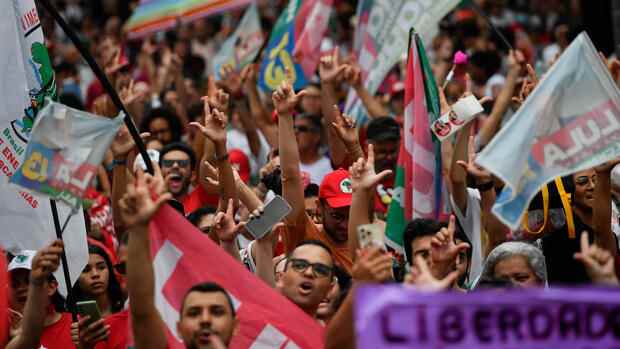The starting position of the two candidates is the same as in the first ballot in early October.
(Photo: AP)
Sao Paulo 165 million Brazilians eligible to vote are called on Sunday to elect the president and twelve governors – including in the economically most important and most populous state of São Paulo.
But public attention is primarily focused on the duel between incumbent Jair Bolsonaro and two-time ex-president Luiz Inácio Lula da Silva. In the four weeks between the first ballot and the run-off elections, the favorites changed several times in this neck-and-neck race.
The starting position of the two candidates is now the same as in the first ballot in early October: Lula leads with 53 percent of the valid votes, ahead of Bolsonaro with 47 percent. And again Bolsonaro says that he was disadvantaged in the election campaign and would fight a defeat “to the last consequence”. That is why there is already talk in Brazil of a “third round of elections” – which President Bolsonaro, who may have lost, would legally carry out.
Furthermore, many election observers consider it possible that if Lula wins the election, there could be violent actions by Bolsonaro’s supporters and regional police commandos. It currently seems unlikely that the military would take part in such an action. Fernando Abrucio, a political scientist, says the United States, which has significant influence over Brazil’s armed forces, has made it clear that it would not accept such an action.
Top jobs of the day
Find the best jobs now and
be notified by email.
The result of the election is still completely open. In the first round, the majority of the polling institutes correctly predicted the votes of Lula, but severely underestimated those of Bolsonaro and his allies. Above all, they had not predicted the shift to the right in Brazilian politics that was taking place in Congress and the federal states. Ultimately, none of the candidates received more than 50 percent of the votes, which is why there is now a runoff.
>> Read here: Brazil’s economy hopes for the left Lula – and a conservative parliament
With this tailwind from the first ballot, it seemed only a matter of time before Bolsonaro drew level with Lula in the polls. Especially since the governors and eliminated center-right candidates in the most populous states of São Paulo, Rio and Minas Gerais declared their solidarity with Bolsonaro.
But then a significant segment of São Paulo’s corporate and financial elite rallied behind Lula. The candidate Simone Tebet, who came third in the election campaign, also spoke out in favor of Lula. It expanded what had previously been a primarily left-wing alliance to include important allies from the center to center-right. So a “Frente Amplia”, i.e. a broad political alliance of the centre, has formed around Lula.
Lula, in turn, stated in an open letter that he wanted to pursue socially and fiscally responsible policies. Pope Francis also stated that he hoped for elections “free of hatred, intolerance and violence”.
Most recently, drunken Bolsonaro supporters had mobbed against the preaching bishop at the mass in the Basílica de Nossa Senhora Aparecida, the basilica of Brazil’s Catholic patron saint. That too may have cost Bolsonaro votes. Despite the rise of evangelicals, Brazil is still the largest Catholic country in the world.
The President recently suffered several setbacks.
(Photo: dpa)
At the same time, Bolsonaro made several mistakes in the campaign that make him appear a dubious character to conservative circles. In an interview, for example, he told of an encounter with young girls from Venezuela, whom he lasciviously described as provocative on the one hand and at the same time denigrated them as prostitutes.
What hurt him the most, however, was an incident a week ago involving a closely allied party leader: The politician Roberto Jefferson, who was under house arrest, was about to be arrested. But he shot at the police officers and threw hand grenades at them. They were slightly injured.
Bolsonaro then struggled to break away from his close ally. Instead of attacking himself, as he usually did during his tenure and now in the election campaign, Bolsonaro had to justify himself.
For the first time in this election campaign, investors on the financial markets reacted nervously to the events. The local currency, the real, depreciated, and prices on the stock exchange fell given the risk that the mood would remain tense even after the elections.
More: Bolsonaro or Lula – who is the lesser evil for Brazil?
